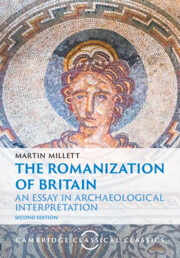Book contents
- Frontmatter
- Dedication
- Contents
- Illustrations
- Tables
- Foreword
- Preface
- Introduction: The Romanization of Britain in perspective
- 1 The Nature of Roman Imperialism
- 2 The Pattern of Later Iron Age Societies
- 3 The Invasion Strategy and Its Consequences
- 4 The Emergence of the ‘Civitates’
- 5 The Maturity of the ‘Civitates’
- 6 Development at The Periphery
- 7 The Developed Economy
- 8 Later Roman Rural Development
- 9 Epilogue: Decline and Fall?
- References
- Index
9 - Epilogue: Decline and Fall?
Published online by Cambridge University Press: 02 January 2025
- Frontmatter
- Dedication
- Contents
- Illustrations
- Tables
- Foreword
- Preface
- Introduction: The Romanization of Britain in perspective
- 1 The Nature of Roman Imperialism
- 2 The Pattern of Later Iron Age Societies
- 3 The Invasion Strategy and Its Consequences
- 4 The Emergence of the ‘Civitates’
- 5 The Maturity of the ‘Civitates’
- 6 Development at The Periphery
- 7 The Developed Economy
- 8 Later Roman Rural Development
- 9 Epilogue: Decline and Fall?
- References
- Index
Summary
In the previous chapters I have reviewed the archaeological evidence for the Romanization of Britain within its historical context and in relation to the social organization of the population. This exercise has inevitably ranged widely and raised a series of sometimes contentious interpretations, but it has shown that there is a set of coherent strands which allows a reasonably consistent interpretation of the archaeology as a reflection of the competition between and within the societies in the province. Romanization has thus been seen not as a passive reflection of change, but rather as an active ingredient used by people to assert, project and maintain their social status. Furthermore, Romanization has been seen as largely indigenous in its motivation, with emulation of Roman ways and styles being first a means of obtaining or retaining social dominance, then being used to express and define it while its manifestations evolved.
- Type
- Chapter
- Information
- The Romanization of BritainAn Essay in Archaeological Interpretation, pp. 212 - 230Publisher: Cambridge University PressPrint publication year: 2025

